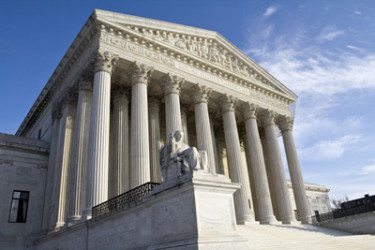Legal Wrap: SCOTUS Turns Away a ‘Roe’ Challenge, But Feticide Laws Pose the Real Risk
The Supreme Court won't take a look at Arizona's 20-week abortion ban, but it will consider a bunch of free speech challenges to abortion rights protections.

Legal Wrap is a weekly round-up of key legal reproductive rights and justice news.
On Monday, the Supreme Court refused to hear a challenge to a Ninth Circuit Court of Appeals decision permanently blocking an Arizona 20-week abortion ban. The case was widely seen as a test case to challenge Roe v. Wade, but as Imani Gandy explains in this excellent piece, it’s not just abortion restrictions that pose a threat to abortion rights and access but the abuse of feticide and fetal “personhood” laws.
The Supreme Court will hear a case that could pave the way for creating a constitutional right to lie, thanks to the Susan B. Anthony List.
The Court hears arguments this week in a case challenging the constitutionality of a Massachusetts buffer zone law. It’s the first time in over a decade the Supreme Court has waded into the waters of abortion rights and protest speech. As I explain here, a lot has changed since the last time the Court took a look.
The Roberts Court also announced it will hear arguments in the cases challenging the contraception mandate, including the Hobby Lobby case, in late March. And while there’s still no order in the Little Sisters of the Poor case questioning the religious nonprofit exemption, Tara Murtha goes beyond Little Sisters for this argument against signing the contraception mandate exemption form.
Finally, the Court heard arguments challenging recess appointments, and early reports indicate the Court is skeptical of those appointments.
Meanwhile, the Obama administration announced it will recognize the same-sex marriages performed in Utah, potentially setting the stage for the Supreme Court to answer the question left untouched in last summer’s marriage equality cases: whether an affirmative right to same-sex marriage exists.
The U.S. Catholic Bishops are at it again, this time dominating a House hearing on the newest version of the No Taxpayer Funding for Abortion Act, Adele Stan reports.
It’s the opening of a lot of state legislative sessions, which means a flurry of anti-choice laws and posturing. Let’s start in Virginia, where Republicans, bitter after last election’s losses, have decided the whole “separation of powers” thing is kind of a hassle and have introduced a bill that would grant “legislative standing” to state lawmakers to defend anti-abortion laws in court.
Virginia, as Erin Matson explains, is helping lead the charge in perpetuating the false choice of pitting “health care” against reproductive health care.
Texas anti-choice policies are back in the headlines, and with tragic consequences. Andrea Grimes reports the latest in the case of Marlise Munoz case, while Katherine Taylor and Lynn Paltrow detail the dehumanizing impact nationwide of “pregnancy exclusion” laws, like the one in Texas.
In other Texas news, the state recently codified its new omnibus anti-abortion law, and Andrea Grimes explains how regulators cherry-picked the facts they relied on for that process.
Looks like forced ultrasounds and waiting periods are on the 2014 legislative agenda in Missouri, as well as increasing protections for crisis pregnancy centers.
A date has been set in the trial over a Wisconsin admitting privileges law.
In Florida, an appeals court threw out a $2.5 million judgment in a medical malpractice case in which a couple argued that doctors failed to inform them of the significant birth defects of their developing fetus in time for them to make a decision about whether to terminate the pregnancy. The defendant-doctors appealed the judgment after they were blocked at trial from arguing that even if they had informed the mother of the birth defects in a timely fashion, it doesn’t matter because later abortions are unavailable in the state.
Some good news: Pennsylvania and New Hampshire each introduced equal pay bills.
In California, a new bill would require a change in the reporting requirements for college sexual assaults.
And in Vermont, legislators introduced a bill affirming the right to an abortion.
